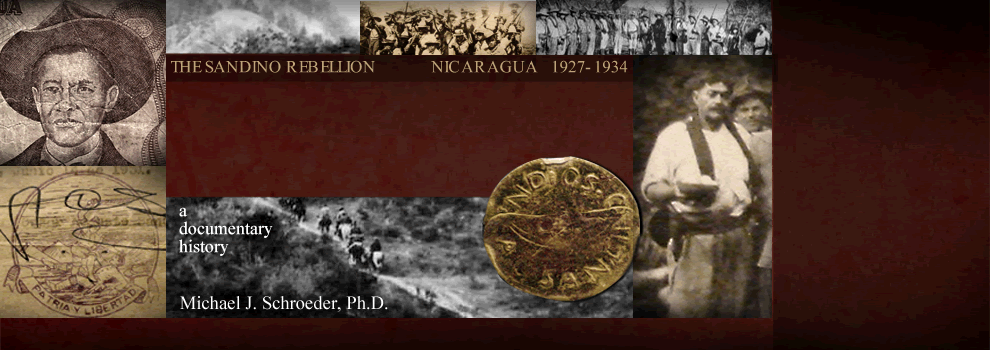
 |
|
M —
D O C S: M I S C E L L
A N E O U S D O C U M
E N T S |
|
thru 1927 |
1928 |
1929 |
1930 |
1931 |
1932 |
1933 + |
|
1
|
2
|
3
|
4
|
5
|
6
|
7
|
8
|
9
|
10
|
11
|
12
|
1
2
3
4
5
6
7
8 9
10 |
1
2
3
4
5
6 |
7
8
9
10
11
12 |
1 2 3 4 5 6 |
7 8 9 10 11 12 |
1 2 3 4 5 6 |
7 8 9 10 11 12 |
1 2 3 4 5 6 |
7 8 9 10 11 12 |
1 2 3 4 5 6 |
7 8 9 10 11 12 |
1 2
3 4 5 6
7 8 9 10 |
|
THIS IS THE SEVENTH
PAGE
of the M-DOCS (Miscellaneous Documents) pages,
covering the month of
September 1927. The page
is in progress.
This website project is
indebted to Mr. Brandon Ray, Summa Cum Laude
college graduate from Ashford University in Iowa
(with a B.A. in History and a minor in Political
Science) for his meticulous transcriptions on
this and many other pages.
|
|
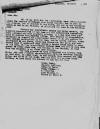
|
September 1, 1927. Letter from
Ruperto Orellano, Gregorio Valle, Tomás Urbana
P., P. Palacios, José Mairena R., and Victor M.
Incer O., Teustepe, to C.O., 5th Regt., Managua.
"Teustepe, September
[blank], 1927 ¶ Commanding Officer, ¶ 5th
Regiment, ¶ Managua. ¶ Dear Sir: ¶ All of us,
with but few exceptions, were revolutionists
under the command of General Jose Maria Moncada.
Due to love to our country, due to respect to
our chief, and due to the confidence which we
had in Mr. Stimson, we delivered our arms to the
American Army. ¶ Without any justifiable reason
and being unarmed, the excited conservatives of
our town and the authorities themselves, have
provoked our most peaceful friends, in a way
that they pretend to convert our peaceful living
into another of disagreeable. Certainly we
respect the perpetrated facts. We do not pretend
to have liberal authorities in our town, but we
invoke justice, order and respect to our lives,
honor and interests. And as we are convinced
that it would not come unless a Marine Guard
comes to stay in our town, we very respectfully
request you let us have said guard. We offer
since now, our welcome to the Marines, so that
they can consider us as their true friends. ¶
For this purpose we have authorized our friends
from Boaco, who have official representation
with the American Command in that city, in order
that, in our behalf, they request the same
thing. And as we do not doubt that you will let
us have those Marines, we have taken the liberty
to ask you for them. ¶ Yours Truly, ¶ Ruperto
Orellano, ¶ Gregorio Valle ¶ Tomas Urbana P. ¶
P. Palacias ¶ Jose Mairena R. ¶ Victor M. Incer
O."
|
|
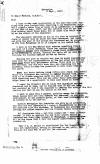
|
September 6, 1927. Letter from
Fred W. Fley, Matagalpa, to Major Erskine, USMC,
p. 1.
"Matagalpa, ¶
6 Sept., 1927. ¶ To Major Erskine, U.S.M.C., ¶
Sir/ ¶ I have to-day made application to the
Jefe Political conforme [in conformity with]
with your instructions repecting [respecting] a
[an] old Winchester rifle and 3 pistols taken
from my house on my plantation in Tapasle on the
19th of Aug., 1927, and was informed that as yet
they know nothing about these arms, but no doubt
they would turn up on the return of the
inspector. ¶ The inspector informed my son at
the time he arrived (7 o’clock at night) that my
house had been denounced, but would not give the
name of the person who denounced me. My property
is far from Matagalpa 10 or 12 leagues in the
indian land. ¶ I have on the San Marcos side
enemies resulting from a law suit of 3 years
standing. There two indians Pedro Lopez and
Benacio Mendez have repeatedly shown their
animosity to me by stealing my cattle, cutting
the tails off my cows and inciting the indians
against me and my family. ¶ Holding the post of
capitan and juez de mesta respectively they they
are the representatives of law and order and are
the only ones armed with government rifles.
Their duty is to disarm everyone, but the only
ones they are disarming are the Liberals, their
friends are permitted to have their arms on the
quiet. ¶ Here are brute indians armed (Often
more drunk than sober) while the foreigner has
nothing to defend himself with. Their duty is to
disarm everyone under the law of June 4, (of
which we know something now). This law was never
fully published, because there is a [an]
opportunity to make some money in fines. ¶ I
asked the Director why my house was signelled
[signaled] out and denounced and by whom, and he
replied that he did not know; but reminded me
that I was supposed to lean on the side of the
revolution and that my son was killed in the
war. ¶ I want to make this a general question
among the foreigners, whose houses have not been
entered and searched, or any arms confiscated,
or any permits given, so that some arrangements
may be arrived at in the matter. ¶ Outside
Matagalpa the inspector can give us no
protection, and does not act impartially – being
a Conservative he carries his politics into his
business, by disarming the Liberals and letting
the indian captain and his friends retain their
arms. ¶ All foreigners have – and have always
had – arms in their houses. If this is against
the law their houses should be searched and
their arms brought to Matagalpa. I denounce them
all in the hopes that a fair and square
understanding may be arrived at. ¶ That a U. S.
Marine be substituted for the inspector who will
act impartially, having no interest in any
party, and this, is the only way to get the law
enforced. [...]"
|
|
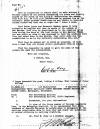
|
September 6, 1927. Letter from
Fred W. Fley, Matagalpa, to Major Erskine, USMC,
p. 2.
"[...] That no
inspection or search shall be made without a
warrant signed by the person denouncing the
house and finally signed by the chief of the
U.S.M.C. authorizing the search from 6.00 a.m.
to 6.00 p.m. (authorized by present law of the
country). Under present conditions we are liable
to have our houses forced any hour day or night
and 7 times a week. ¶ That Pedro Lopez and
Benancia Mendez cease to have authority as
capitan and juez de mesta of the canada of San
Marcos. That they be questioned as to the
stealing of my cows during the days of the last
canton in San Marcos. These two men stole my
cows it was supposed to feed the soldiers that
they had under arms in San Marcos. They never
made any representation to me by any authority
authorizing this act.* ¶ That they be warned not
to enter my property. If they have a need they
can always obtain permission from my house. ¶
That the inspector be asked to give the name of
the person who made the denouncement. ¶ With due
respects, ¶ I remain, Sir, ¶ Yours truly, ¶ FRED
W. FLEY. ¶ * Lopez deserted his post, hiding 9
rifles. What became of those rifles? ¶
80-FSNE-wib ¶ 1st Endorsement ¶ 9 September,
1927. ¶ HEADQUARTERS THIRD BATTALION FIFTH
REGIMENT SECOND BRIGADE US MARINE CORPS,
MATAGALPA, NICARAGUA. ¶ From: The Commanding
Officer. ¶ To: The Commanding Officer, Fifth
Regiment. ¶ 1. Forwarded, for your information.
¶ 2. In view of the large number of foreign
residents here, in the Matagalpa District, it is
recommended that a detachment of Guardia
Nacional be established in Matagalpa at the
earliest practicable date to look over and check
the operations of native officials in outlying
districts. ¶ 3. Mr. Fred W. Fley is a British
subject. ¶ F. S. N. ERSKINE"
|
|
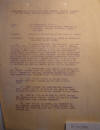
|
September 7, 1927. "Report on
activities of one Ramón B. Tellez," Major
Glenn E. Hayes, C.O. Ocotal, to Minister of
Gobernación, Managua, p. 1.
"Headquarters, Division of Nuevo Segovia [Nueva
Segovia], Guardia Nacional de Nicaragua, Ocotal,
Nicaragua, September 7, 1927. ¶ From: The
Commanding Officer. ¶ To: The Minister of
Gobernacion, Republic of Nicaragua, Palacio
Nacional, Managua, Nicaragua. ¶ Subject: Report
on activities of one Ramon B. Tellez. ¶
Reference: Your telegram quoted in Chief of
Guardia’s dispatch number 12007. ¶ 1. In
connection with the reference, you are informed
that my personal contact with Ramon B. Tellez
covers the period from August 4, 1927 to August
25, 1927. In those twenty days, however, I have
had considerable opportunity to observe that
individual in the performance of his duties as
acting jefe politico of this department, and to
arrive at reasonable logical conclusions as to
his character and value as a public officer. It
is my firm belief, based upon that observation,
that Tellez is so addicted to the use of alcohol
as to render him completely unfitted to hold any
public office in the republic. ¶ 2. In
connection with Tellez’ relations with the
bandit Sandino prior and since the action of
July 16, 1927, I report as follows, offering
information that I have received from sources
which I consider reliable. ¶ (a) That Tellez
served in fairly close association with Sandino
in the late revolution. ¶ (b) That Sandino was
considerably incensed when Tellez decided to
turn in his arms at Boaco instead of joining him
in his retreat to the hills. ¶ (c) That at 3:00
am on July 16, 1927, during the engagement at
Ocotal, Tellez was on the streets of that city
with a drawn revolver. ¶ (d) That Tellez, so
armed, was observed by one Colonel Canales, of
the Sandino forces, who ordered him disarmed,
and that these orders were carried out. [...]"
|
|
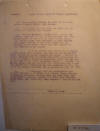
|
September 7, 1927. "Report on
activities of one Ramón B. Tellez," from Major
Glenn E. Hayes, C.O. Ocotal, to Minister of
Gobernación, Managua, p. 2.
"[...] Subject: Report on one Ramon B. Tellez
(continued) ¶ (e) That nothing further is known
of the movements of Tellez during that action. ¶
(f) That Tellez at that time was under the
influence of intoxication liquor. ¶ (g) That on
or about July 22, 1927, Tellez informed a
relative of his at San Fernando that the column
under the command of Major Oliver Floyd, U.S.
Marine Corps, was intending to move through that
city. Whether or not this report had any bearing
on the later attack upon that column at San
Fernando is not known. ¶ 3. It is my belief that
Tellez is, at heart, a sympathizer with Sandino,
but that he has lacked the moral courage to
openly espouse his cause. I believe it highly
probable that he spread subversive propaganda in
favor of Sandino, signed or otherwise. These
beliefs are shared with me by First Lieutenant
Grover C. Darnall, U.S. Marine Corps, who has
observed that individual for a longer period
that myself and who was stationed in this city
prior to, during and after the engagement on
July 16, 1927. ¶ 4. I recommend that you
communicate with Captain Gilbert D. Hatfield,
U.S. Marine Corps, who was in command of marines
in this city for some time. His opportunity to
observe Tellez, and under more critical
conditions, was, naturally, more expensive than
my own has been. ¶ Glenn E. Hayes."
|
|
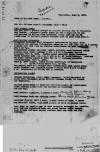
|
September 8, 1927. Memo from 1st
Lieut. H. S. Keimling, Commanding Officer,
Telpaneca, to C.O., 5th Regt., Managua, p. 1.
"TELPANECA,
Sept 8, 1927. ¶ MEMO TO C.O. 5th Regt., MANAGUA.
¶ [unreadable, possibly “Jd.”] Lt. Millers
[Miller’s] patrol Palaquina 1415-8605 ¶ Inf.
Pueblo Nuevo ¶ Arr Tel 2000 – passed groups of
natives leaving Tel to Palaquina and Somoto.
Salgado’s group where [were?] in Tel 2 days had
40 men all mounted 25 rifles rest machetes.
Group left Tel by NE route when Lt Miller’s
patrol entered town by main road from W. ¶
Information Matagalpa ¶ Telegraph operator took
telegraph instruments in July. Have Guardias out
getting information where he is. Tel line out in
7 places ¶ Cossack Post and Pick up station
established on [unreadable] yds W of Tel. ¶
Reconnaince [Reconnaissance] patrol reported
bandit activity near Carbonal which natives call
Santo Domingo 2 1/2 L N of Telpaneca. Report
received Sept 6, 1927. Bandit Group reported in
[unreadable] Cucharres which natives call San
Juan 2 1/2 L. N. of Santo Domingo. Natives
reported taking supplies from Tel to S. Domingo.
Guardias investigating. Sept 7, 1927. ¶ Sept 7,
1927 9 a.m. Rifle firing heard N.E. of Telpaneca
¶ “ “ “ 11:30 firing heard N.W. of Tel. ¶ Rec
patrol sent out brought back information that
armed group under Sanchez and Augustin Flores
circled town 2 1/2 Leagues N of Telpaneca; 15
Rifles and 10 machete. ¶ Information Ocotal ¶
Abraham Gutierrez, Pedro Labor Paguagua, Ocotal
reported in touch with Hernandez group divided
between North of Ocotal and Telpaneca. ¶ Request
permission to send out Officers patrol to
investigate Santo Domingo & San Juan (10 Marines
10 Guardias) for one day. ¶ Need Medical
Supplies, 1 Malaria case. ¶ Need Message Book
and writing paper. ¶ Reported Sept 8, 1927 7
a.m., 1 mile South of here, 6 armed men reported
there, will send patrol as soon as planes leave.
¶ Have dope on Sandino spy in town carrying
messages for Sandino. Will try and intercept
same and place bearer under arrest. Hard to get
inf here as all natives here are with and for
Sandino. [...]"
|
|
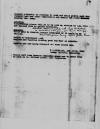
|
September 8, 1927. Memo from 1st
Lieut. H. S. Keimling, Commanding Officer,
Telpaneca, to C.O., 5th Regt., Managua, p. 2.
"[...] Request
authority to continue to send out small patrol
each day. Cossack Post has under observation all
trails and roads leading into town. ¶ Aviation ¶
C.O. Aviation please tell me if my pick up
station is O.K. will not request pick up unless
necessary. ¶ Managua: ¶ Would like to receive
Managua newspaper if it would be no trouble. ¶
Health of detachment good ¶ Marines and Guardias
working good together on patrols. ¶ Bandits are
now using recapped and hand loaded amm
[ammunition]. ¶ H.S. KEIMLING, 1st Lieut, USMC ¶
Comdg. Officer, Telpaneca ¶ People left town
because Hernandez group was to enter town as
soon as Lt. Millers [Miller’s] patrol left
Telpaneca."
|
|
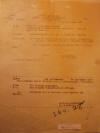
|
September 14, 1927. "Instructions
for the use of codes and cipers," T. T. Cravens,
Navy Dept., Office of Naval Operations,
Washington, to C.O. Marine Detachment, American
Legation, Managua.
"Op-19 ¶ (SC) A6-3(6) ¶ NAVY DEPARTMENT ¶ OFFICE
OF NAVAL OPERATIONS ¶ WASHINGTON ¶ VJL ¶ 14
September 1927 ¶ From: Chief of Naval
Operations. ¶ To: Commanding Officer, Marine
Detachment, American Legation, Managua, ¶
Subject: Instructions for the use of codes and
ciphers. ¶ Enclosure. (a) Copy of Commanding
Officer, Marine Detachment, American Legation,
Managua, despatch 86030930. ¶ 1. The enclosure
violates paragraph 218 of C.S.P. 457. ¶ T.T.
CRAVENS, ¶ By direction ¶ C O N F I D E N T I A
L ¶ 122-h ¶ 1st Endorsement ¶ 27 September 1927
¶ HEADQUARTERS SECOND BRIGADE MARINE CORPS,
MANAGUA, NICARAGUA. ¶ From: The Brigade
Commander. ¶ To: The Brigade Communications
Officer. ¶ 1. Forwarded for a thorough
investigation and report. ¶ WM.H. HOLLINGSWORTH,
¶ By direction"
|
|
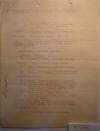
|
1.
September 17, 1927.
"Intelligence report for the week ending
September 17, 1927," Major Glenn E. Hayes, C.O.
Ocotal, to Chief of the G.N., Managua, p. 1.
"Headquarters,
Division of Nueva Segovia, Guardia Nacional de
Nicaragua, Ocotal, Nicaragua, September 17,
1927. ¶ From: The Commanding Officer. ¶ To: The
Chief of the Guardia Nacional de Nicaragua,
Managua, Nicaragua. ¶ Via: Official Channels. ¶
Subject: Intelligence report for the week ending
September 17, 1927. ¶ Reference: Paragraph 15,
Special Order #60 ¶ 1. In accordance with the
provisions of the reference, I report as follows
for the week ending September 17, 1927: ¶
GENERAL STATE OF TERRITORY OCCUPIED: ¶ (a)
Ocotal – peaceful ¶ (b) Jicaro – peaceful ¶ (c)
Intervening territory – generally peaceful. ¶
ATTITUDE OF CIVIL POPULATION TOWARD FORCES: ¶
(a) Ocotal – cordial and completely cooperative.
¶ (b) Jicaro – cordial and partially
cooperative. ¶ (c) Intervening territory –
apparently cordial. ¶ ECONOMIC CONDITIONS: ¶ (a)
Ocotal – generally very good and growing better
daily. Carts are arriving frequently from Leon
and the stores are becoming restocked. Peasants
are coming to town from outlying districts each
day with fresh provisions. ¶ (b) Jicaro – poor.
Merchants are fearful of bringing in merchandise
for fear Sandino will return to that city in
accordance with his threat. ¶ (c) Intervening
territory – good. Land owners are occupying
their farms and carts are making regular trips
to and from Ocotal. ¶ ATTITUDE OF PRESS: ¶ (a)
No periodicals published in division. [...]"
|
|
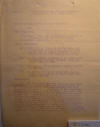
|
2.
September 17, 1927.
"Intelligence report for the week ending
September 17, 1927," Major Glenn E. Hayes, C.O.
Ocotal, to Chief of the G.N., Managua, p. 2.
"[...]
Subject: Intelligence report for the week ending
September 17, 1927. (continued) ¶ FRICTION
BETWEEN TROOPS AND CIVIL POPULATION: ¶ (a) None.
¶ POLICE OPERATIONS: ¶ (a) Ocotal – one arrest
of individual suspected of possessing rifle and
of other crimes. ¶ (b) Jicaro – no arrests. ¶
Military Operations: ¶ (a) Major Glenn E. Hayes,
Guardia Nacional, with one sergeant and one
private together with interpreter and another
civilian Ocotal to Jicaro with pay roll
September 13 and 14. ¶ (b) The same persons,
augmented by one rifle squad and Guardia
telegraph linesman, Jicaro to Ocotal September
17th. ¶ (c) Both patrols were accomplished
without accident or incident. ¶ (d) Two patrols
from Jicaro during week. One to Sabana Grande
and one to Sabana Largo; both without incident.
¶ MISCELLANEOUS: ¶ (a) All information this week
points to the strong influence of the bandit
Sandino over the inhabitants of this department
east of Jicaro and including that city. It
appears that Sandino has proclaimed to the
inhabitants – whether in writing or by word of
mouth is not known – that he would not be
responsible for the actions of his men as
regards the lives and property of any persons
continuing residence in cities or territories
occupied by American Marines or the Guardia.
Furthermore, his spies would list persons who in
any way assist or fraternize with members of
those forces with the view of their eventual
punishment for their indiscretion when he
resumes control of those areas, and which he
assures them he will do. The net result of this
propaganda is that the city of Jicaro is
practically depopulated, only such people
remaining there as have the […]"
|
|
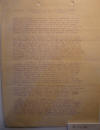
|
3.
September 17, 1927.
"Intelligence report for the week ending
September 17, 1927," Major Glenn E. Hayes, C.O.
Ocotal, to Chief of the G.N., Managua, p. 3.
"[...]
Subject: Intelligence report for the week ending
September 17, 1927. (continued) ¶ […] temerity
to face his threat, who have confidence in our
ability to ultimately suppress him, or who have
already incurred his disfavor. Those persons who
are at present living in Jicaro are doing
practically nothing toward the restoration of
their homes or the town but are grouped together
with several families to each house for their
mutual protection and comfort. There are at
present 105 persons in that town other than the
Guardia or Marines. ¶ (b) It is my belief, and
that of my officers, that Sandino is actively
present in Chipote. Salgado is reliably reported
to have joined there with 200 men about five
days ago. Prior to that time he is reported to
have had but 100 men under his personal control.
Sandino keeps his “cause” before the people of
the countryside by operating small bandit groups
under their respective jefes who personally gain
by extracting small contributions. This policy,
I believe, has encouraged the organization of
small independent bands of thieves who are not
connected with him but who assume his name in
order to relieve themselves of responsibility of
their acts of vandalism. ¶ (c) Chipote or Olingo
Mountain – they are synonymous – despite the
several averments to the contrary, undoubtedly
exists. Confirming reports from most reliable
sources place it as about 2000 yards east of
Santa Rosa, a small village of about six or
seven houses, which is about four leagues
directly east of Jicaro. Santa Rosa is reported
occupied by Sandinistas of whom there are about
thirty in number under the command of Fernando
and Coronado Mariadaga. This report on the
location of Chipote agrees in all respects with
the sketch submitted by 1st Lieutenant George
O’Shea at Jicaro to the Brigade Commander
recently. ¶ (d) Sandino undoubtedly possesses
ample supplies of canned goods from looted
stores and, of course, has complete control of
all foodstuffs such as beans, rice, corn and
beef in the area occupied. Judging from the
stray cattle observed by recent patrols and by
myself, I believe he has sufficient beef in the
Murra Valley to last a year. ¶ (e) The home of
Damasco and Gregorio Garcia at Poterillo, two
leagues east of Jicaro, was reported robbed by
mounted Sandinistas who abducted their sister,
Petrona, and took her to Chipote. She was
released, however, and efforts will be made to
get in communication with her for the purpose of
obtaining information. Other reports of petty
depredations east of Jicaro are of almost daily
occurrence, Carmen Torrez, a former resident of
Jicaro and a leader of a small band, being a
particular offender. [...]"
|
|
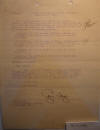
|
4.
September 17, 1927.
"Intelligence report for the week ending
September 17, 1927," Major Glenn E. Hayes, C.O.
Ocotal, to Chief of the G.N., Managua, p. 4.
"[...]
Subject: Intelligence report for the week ending
September 17, 1927. ¶ (f) Heavy bombing was
heard in the vicinity of Jicaro on the following
dates and at the times indicated. It is believed
that this bombing was done with the view of
disturbing the morale of the Jicaro garrison and
not with the intention of destroying property: ¶
September 13, 8:00 am east of Jicaro. Planes
were requested to reconnoitre [reconnoiter] area
and reported nothing suspicious. ¶ September 13,
7:00 pm south of Jicaro. Patrol sent to Sabana
Grande and reported that bombing was done in the
road by a small band. No damage or casualties ¶
September 14, 6:30 pm north of Jicaro, no damage
reported. ¶ September 15, 11:00 am in direction
of Murra Road. No damage reported. ¶ POLITICAL
SITUATION: ¶ (a) Liberal: ¶ Señor Don Jose
Francisco Moncada appointed Jefe Politico and
Commandante de Armas of Department of Nueva
Segovia on September 10, 1927, vice Major Glenn
E. Hayes, Guardia Nacional, temporarily, acting.
Accepted appointment and was sworn into office
on September 11, 1927. ¶ (b) Conservative: ¶ No
changes. ¶ Glenn E. Hayes. ¶ Distribution: ¶
Chief of Guardia Nacional, ¶ Confidential file."
|
|
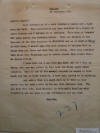
|
September 19, 1927. Letter from
2nd Lt. Kenneth B. Chappell, Pataste, to Captain
R. W. Peard.
"POTASTE ¶ 19
September 1927. ¶ Captain Peard:- ¶ Have
information of a band located a league and a
half from MAL PASO. This information has been
verified by a couple of other sources and I
believe it is reliable. This band is located 200
yards across the Honduras border. They are
staying at the Hacienda of the Jefe Politico of
CHOLUTECA but as to whether he is in with them,
I cannot say; but have reasons to believe that
he knows they are there and what they are doing.
From this location they cross into Nicaragua and
do asthey [as they] please then return where we
cannot follow. ¶ I have here now a man from MAL
PASO, who is a Juez de Mesta; this man was
robbed by this band and knows their exact
location. This is one of the several reports in
regard to this band, but due to their location,
I have been unable to do anything. ¶ Any action
that you might wish me to take in this matter
you can send a note by the man that delivers
this. The man with this note, Luis Fiallos, is
thoroughly familiar with conditions and can give
you any information you may wish. ¶ CHAPPELL."
|
|
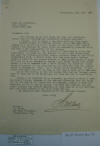
|
September 22, 1927. Letter from S.
Milon, Providence, R.I., to US Consul A. J.
McConnico, Bluefields.
"Providence, Sept
22nd 1927 ¶ Hon. Mr. McConnico, ¶ U.S. Consul, ¶
Bluefields, Nic. ¶ Honorable Sir: ¶ Your message
by Mr. Nat Kloch has just been received. Please
send me instructions concerning evidence
required. ¶ I should like to state a few facts
that may help some. ¶ General Viquez is personal
witness that I was shot while forced on a
commission by his comand [command] on May 20th,
1926. General Viquez took statment [statement]
of these facts and personally promised me to see
that I was compensated for the damage. ¶ General
Arguello was in charge of Rama when my house was
distroyed [destroyed]. He knows all the details
of how it was broken down and used for Firewood,
Coffins, andfor [and for] building Camps on the
hills. Considering this, I should think that the
same Generl [General] Gustavo Arguello would be
the proper witness to sign these papers of mine.
If I had to go to Managua to remind himof [him
of] these things that would entail a lot of
expence [expense] that I can’t afford. Why
could’nt [couldn’t] these facts be brought to
his recollection and have him sigh [sign] the
papers there in Managua by mail¿ If it should be
so necessary to get other officials that was in
Rama at the time I could get a few here. ¶ As to
the Looting of the two houses that had my
things, every body in Rama can be my witnesses,
and some who are in Bluefields now. ¶ Should I
be deprived of my property, my tools by which I
made an honest living, because of the various
obstacles that are being put in the way by the
Commission of Reclamas, making it more
inconvient [inconvenient] for me to get my
money¿ I am just now down and out and can’t
undergo any further expence [expense]. My only
hope is in you that you will try your utmost to
get this money for me. ¶ I am awaiting your
instruction at the earliest moment. ¶ Yours
truly ¶ Address. ¶ S. Milon, ¶ c/o John
Driscall, ¶ Providence. R/E"
|
|
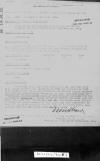
|
September 22, 1927. "Record of
events for period 0000 Sep 27 to 2400 21 Sep
27," Captain H. M. Shaw, C.O. Chinandega.
"Twentieth Company,
3rd Battalion, 5th Regiment, ¶ Second Brigade,
Marine Corps, Chinandega, Nic., ¶ 22 September
1927. ¶ Record of events for period 0000 15 Sep
27 to 2400 21 Sep 27. ¶ Map: Nicaragua (HAM) -
1:500000, 1924. ¶ LOCATION OF OUTLYING
DETACHMENTS ¶ Chichigalpa, San Antonio, El Viejo
and Somotillo. ¶ 1 man on detached duty at Field
Hospital, La Moca. ¶ LOCATION OF MAIN BODY¶
Chinandega. ¶ DUTIES PERFORMED ¶ Train guard,
garrison of town and points along lines of
communication, maintaining order and
guaranteeing personal and property rights to
residents of District. ¶ STRENGTH AVAILABLE ¶
Officers ¶ Enlisted ¶ Total ¶ 2 ¶ 79 ¶ 82 ¶ On
leave. ¶ 1 ¶ WEATHER FOR PERIOD ¶ Warm days and
rainy nights. ¶ CONDITION OF ROADS ¶ Bad. ¶
EVENTS (General) ¶ Conditions extremely quiet
during period. One bull cart with escort arrived
from Somotillo on 17th and returned on 18th with
clothing and stores for Somotillo Detachment.
Report received that band of approximately ten
armed men have been operating (extortion and
thievery accompanied by considerable brutality)
in the vicinity of Posoltega. Strong patrol of
Guardia has been sent out after this band from
Chichigalpa and the Non-Commissioned Officer in
Charge of Marine Outpost at that place has been
instructed to lend all possible assistance to
the Guardia if called upon. Four Marines with
Guardia patrol pursuing this band. ¶ [first
initial unreadable, possibly “H” or “N”]. M.
SHAW ¶ Captain, U. S. M. C., ¶ Commanding
District of Chinandega, Nic."
|
|
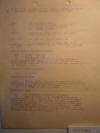
|
1.
September 24, 1927.
"Intelligence report for the week ending
September 24, 1927," Glen E. Hayes, C.O. Ocotal,
to Chief of the G.N., Managua, p. 1.
"Headquarters,
Division of Nueva Segovia, Guardia Nacional de
Nicaragua, Ocotal, Nicaragua, September 24,
1927. ¶ From: The Commanding Officer. ¶ To: The
Chief of the Guardia Nacional de Nicaragua,
Managua, Nicaragua. ¶ Via: Official Channels. ¶
Subject: Intelligence report for the week ending
September 24, 1927. ¶ Reference: Paragraph 15,
Special Order #60. ¶ 1. In accordance with the
provisions of the reference, I report as follows
for the week ending September 24, 1927: ¶
GENERAL STATE OF TERRITORY OCCUPIED: ¶ (a)
Ocotal – peaceful ¶ (b) Jicaro – peaceful ¶ (c)
Intervening territory – generally peaceful –
bands retreating from Telpaneca area are
reported to have passed through this area but no
contact has been secured by our patrols. ¶
Attitude of Civil Population: ¶ (a) No change. ¶
ECONOMIC CONDITIONS: ¶ (a) Ocotal – good. Carts
are not moving to and from Leon due to bad
weather. Investigation discloses that this lack
of movement is not due to fear of bandits. ¶ (b)
No change in other districts. ¶ ATTITUDE OF
PRESS: ¶ (a) No periodicals published in
division. ¶ (b) Copy of Revista Ariel printed at
Tegucigalpa, Honduras, under date of September
1, 1927, and containing a signed article by the
bandit SANDINO and other pro-Sandino propaganda
is enclosed. The article on page 962 of that
copy originating from Telpaneca is reported to
have been written by one Lola Matamores, an
ardent admirer of Sandino, who resides in that
city. I suggest subscription to such Honduranian
[Honduran] periodicals as you may deem
appropriate. [...]"
|
|
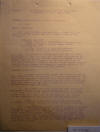
|
2.
September 24, 1927.
"Intelligence report for the week ending
September 24, 1927," Glen E. Hayes, C.O. Ocotal,
to Chief of the G.N., Managua, p. 2.
"[...] Subject:
Intelligence report for the week ending
September 24, 1927. (continued) ¶ Friction
Between Troops And Civil Population: ¶ (a) None
¶ POLICE OPERATIONS: ¶ (a) The following
prisoners were released upon receipt of written
orders from the criminal judge of this district:
¶ September 21, 1927: ¶ Julian Rodriguez –
acquitted and furnished bond pending review of
case by higher court. ¶ September 22, 1927: ¶
Narcisco Hernandez – same as Rodriguez. ¶
Demetrio Lopez – insufficient evidence. ¶ (b)
The Director of Police conferred with the Medico
de Sanidad of this department with the view of
requiring all inhabitants of cities to install
toilet facilities in their houses. Very few
houses in this city and in Jicaro have those
facilities which is believed to be largely
responsible for the prevalence and spread of
amoebic dysentery. The results of this
conference are still pending. ¶ MILITARY
OPERATIONS: ¶ (a) A patrol of one rifle squad
left Ocotal at 8:00 AM September 19, 1927, and
arrived at Jicaro on September 20, 1927. This
patrol engaged in telegraph line maintenance
enroute. The non-commissioned office in command
reported that no armed persons were encountered
and that depredations were reported by
inhabitants along the route. ¶ (b) Two patrols
were made during the week by Lieutenant Bruce
with one rifle squad accompanying him. The first
to El Cacao, three miles toward San Albino Mine
from Jicaro, reported the area quiet with no
depredations. The second, the same distance
toward Murra and with the same report. ¶ (c)
Search for a suitable landing field, emergency
or otherwise, in the vicinity of Jicaro is being
continued. ¶ (d) A patrol of ten marines under
the command of Lieutenant James H. Satterfield,
Guardia Nacional, arrived at Ocotal at 9:30 PM
September 20, 1927, from Telpaneca with Raso
Fernando Acuna #119, wounded in the action at
that place. Raso Acuna was transferred to
Managua for hospitalization by plane on
September 21, 1927. Satterfield brought airplane
pick ups that planes were unable to lift and
which were transmitted to your office in code.
[...]"
|
|
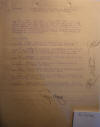
|
3.
September 24, 1927.
"Intelligence report for the week ending
September 24, 1927," Glen E. Hayes, C.O. Ocotal,
to Chief of the G.N., Managua, p. 3.
"[...] Subject:
Intelligence report for the week ending
September 24, 1927, (continued). ¶ (e) Same
patrol under same officer left Ocotal at 8:30 AM
September 22, 1927 for Telpaneca via Pueblo
Nuevo taking with them Lewis machine guns and
ammunition for the Third Company, Guardia
Nacional. Their arrival at Pueblo Nuevo and
acknowledgment of receipt of arms and ammunition
was reported by the commanding officer of that
company by telegraph the same evening. ¶
MISCELLANEOUS: (a) Heavy bombing was heard in
the direction of Telpaneca in the early evening
on September 20, 1927. ¶ (b) Anastacio
Hernandez, conservative, with a small band is
reported to be operating to the north and west
of this city. No specific depredations have been
reported. ¶ (c) Salgado is reported to have been
wounded in the chest in the action at Telpaneca.
¶ (d) Bandits have been reported concentrating
at San Albino Mine during the week. ¶ (e)
Refugee family from San Juan de Telpaneca
reports that Sandino intends to attack Jicaro
next. ¶ (f) General situation as to Sandino’s
influence over the inhabitants of this
department as stated in my report of September
17th, is unchanged. ¶ (g) About thirty (30)
persons are sleeping in the quarters of the
Guardia Nacional in this city for protection. ¶
Glenn E. Hayes."
|
|
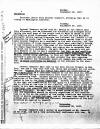
|
September 26, 1927. Memo on
Emiliano Chamorro from US Minister Charles
Eberhardt, Managua, to Sec. State, Washington,
p. 1.
"Monday, ¶ September 26, 1927. ¶ NICARAGUA ¶
Received letter from General Chamorro, advising
that he is coming to Washington tomorrow. ¶
Tuesday, ¶ September 27, 1927. ¶ General
Chamorro called with Mr. Zavala at the office
late this afternoon, and we discussed the
situation and arranged about having him meet
some of the people here to whom he wants to give
information about Nicaraguan matters. He told me
that Minister Eberhardt before leaving Nicaragua
had informed the leaders of the Conservative
Party that the State Department wanted them to
eliminate General Chamorro as a candidate in the
next election, and that in consequence of these
suggestions, which were practically orders, he
had received a letter from some of his friends
advising him of the State Department’s attitude,
and urging him to announce that he would not be
a candidate. He said that he personally did not
care whether or not he was a candidate, but that
he was unwilling to take this position at the
orders of the State Department, and wanted,
before doing anything, to find out just what the
State Department’s position was and on what
grounds they were opposing him, and whether his
withdrawal would not weaken his party so much
that it would inevitably be defeated by the
Liberals in the election. ¶ General Chamorro
said that he had seen Colonel Stimson in New
York, and had a long talk with him, which was
pleasant but not satisfactory. Stimson told him
flatly that under the Constitution he was
disqualified as a candidate because no one who
held the office of President during a
Presidential term could be a candidate for the
succeeding term. Stimson apparently admitted
that this interpretation of the Constitution was
not his own, but had been suggested to him by
the State Department. General Chamorro explained
to him that the Constitution did not apply to a
President unless he was in office at the time of
the election, and certainly could not apply in
his case because he was neither in office now
nor had the Department ever admitted that he had
constitutionally held the office of President.
He said that it seemed extraordinary to him that
the Department should be utterly regardless of
the Constitution in so far as its control of the
coming elections was concerned, which is wholly
unconstitutional, and at the same time should be
insisting upon a far fetched and incorrect
interpretation of the Constitution as applied to
himself. ¶ Wednesday, ¶ September 28, 1927. ¶
General Chamorro and I called by appointment on
Mr. Bennett, of the Post, and had a very
satisfactory conference with him. In […]"
|
|
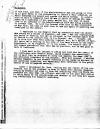
|
September 26, 1927. Memo on
Emiliano Chamorro from US Minister Charles
Eberhardt, Managua, to Sec. State, Washington,
p. 2.
"[...] NICARAGUA ¶ […] of the vote, and that if
the Administration was not going to live up in
good faith to its undertaking to insure a fair
election, he would withdraw his assent and
oppose the whole scheme. In conclusion he said
to Chamorro that he was in favor of having him
nominated as a candidate if his party wanted
him, and that he would like to be informed if
the Administration here was going anything to
prevent that. He told the General also that he
was accessible at any time, and that he must
come to see him again if anything new developed
in the matter. ¶ I explained to the Senator that
my connection with the matter was purely as a
friend of Chamorro, and that I was not
representing any party or faction, and had no
interest in the outcome apart from my desire to
see justice done to the General, who, I thought,
had up to this time been very unfairly treated,
and, as a matter of fact, had never had a
hearing on his side of the case either by the
State Department, or by Congress, or in the
press. The Senator said he had always understood
that this was my position, and he was glad to
have it confirmed. ¶ I then went to Mr.
Bennett’s office and told him the result of the
conference with Senator Borah, which pleased him
exceedingly, and he said that he proposed to
carry out exactly the same line in his editorial
treatment of the subject. With his consent, I
advised General Chamorro to put himself entirely
in his hands as advisor on all political
questions, and especially with reference to the
publication of any propaganda material. ¶ Later
I telephoned Mr. Hard, telling him the result of
the conference, and he has promised to keep in
touch with General Chamorro during my absence
and also to find out definitely from the State
Department not only what its official attitude
is but also what action is being taken by the
subordinates and whether or not they are
opposing insidiously the Chamorro candidacy."
|
|
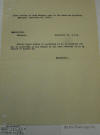
|
September 28, 1927. Radiogram from
US Consul A. J. McConnico, Bluefields, to US
Minister, Managua.
"(True reading of Code Message sent to the
American Legation, Managua, September 28, 1927.)
¶ MINISTER, ¶ Managua. ¶ September 28, 3 P.M. ¶
Albert Fagot wishes to ascertain if it is
possible for you to intercede in his behalf in
the case referred to in my report of August 10.
¶ McConnico."
|
|
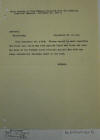
|
September 29, 1927. Radiogram from
Dana Munro, US Legation, Managua, to US Consul
A. J. McConnico, Bluefields.
"(True reading of Code Message received from the
American Legation, Managua, September 29, 1927.)
¶ AmConsul, ¶ Bluefields, ¶ September 29, 10
A.M. ¶ Your September 28, 3 P.M. Please report
by mail regarding the facts upon which the suit
against Fagot was based and also the date of the
Supreme Court decision against him with any
other information throwing light on the case. ¶
MUNROE."
|
|
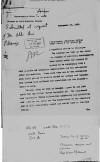
|
1.
September 30, 1927.
"Developments in the Nicaraguan Situation during
the absence of Mr. Olds August 5 to October 3,"
from Edwin V. Morgan, State Dept., to Robert Olds,
State Dept., Washington, p. 1.
"DEPARTMENT OF STATE ¶ DIVISION OF
LATIN-AMERICAN AFFAIRS ¶ September 30, 1927. ¶
[text blocked] Nicaraguan Situation during [text
blocked] Olds August 5 to October 3. ¶ [text
blocked] important events in Nicaragua [text
blocked] The country has been on the whole [text
blocked] an absence of political developments.
[text blocked] been placed under the command of
[text blocked] appears to be developing into a
very capable and efficient organization and has
maintained order successfully. There have been
one or two skirmishes with small groups of
bandits headed by Sandino and Salgado. The
Marines have suffered two casualties and the
bandits a score or more. ¶ General McCoy arrived
in Managua August 24 and left again for the
United States September 13. The Department has
received a little information concerning his
activities and opinions and plans for the
supervision of the elections and he will
undoubtedly report and confer here in the near
future. ¶ The […]"
|
|
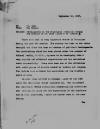
|
2.
September 30, 1927.
"Developments in the Nicaraguan Situation during
the absence of Mr. Olds August 5 to October 3,"
from Edwin V. Morgan, State Dept., to Robert Olds,
State Dept., Washington, p. 2.
"[...] September 30, 1927. ¶ To: Mr. Olds ¶
From: Mr. Morgan ¶ Subject: Developments in the
Nicaraguan Situation during the absence of Mr.
Olds August 5 to October 3. ¶ There have been no
very important events in Nicaragua during the
past two months. The country has been on the
whole tranquil and there has been an absence of
political developments. The constabulary which
has been placed under the command of Colonel
Beadle, U.S.M.C., appears to be developing into
a very capable and efficient organization and
has maintained order successfully. There have
been one or two skirmishes with small groups of
bandits headed by Sandino and Salgado. The
Marines have suffered two casualties and the
bandits a score or more. ¶ General McCoy arrived
in Managua August 24 and left again for the
United States September 13. The Department has
received a little information concerning his
activities and opinions and plans for the
supervision of the elections and he will
undoubtedly report and confer here in the near
future. ¶ The […]"
|
|
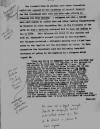
|
3.
September 30, 1927.
"Developments in the Nicaraguan Situation during
the absence of Mr. Olds August 5 to October 3,"
from Edwin V. Morgan, State Dept., to Robert Olds,
State Dept., Washington, p. 3.
"[...] The Conservatives in general have shown
themselves definitely opposed to the candidacy
of General Chamorro for the Presidency next year
and have made efforts to dissuade him from
running. ¶ A telegram and also a letter were
sent signed by Adolfo Diaz and other leading
Conservatives to Chamorro in Paris suggesting
that in the interests of the party he make a
definite statement that he does not choose to
run in 1928. This telegram was shown to the
Legation and with Mr. Eberhardt’s consent
approved by the Department, the telegram
contained a statement showing that it had been
shown to the Legation and the Department of
State. In this connection the Department sent
the following important statement of policy to
the Legation in a telegram dated August 22. ¶
“Diaz may state to Chamorro that he has notified
the Department of State and the Legation of his
message as you suggest in your 205, August 20, 9
a.m. In my opinion, he is not eligible under
Article 104 of the Constitution of Nicaragua
because he was de facto president and held the
office during a part of the term preceding the
next election. Unless the Constitution means
this, it would have little effect because if one
could hold the office during a part of the term,
then resign and become a candidate, it would
entirely nullify the intent of this provision.
We refused to recognize him because he obtained
the office in violation of the treaty. I think
as a last resort I should be willing to notify
Chamorro that the Department does not consider
him eligible under the Constitution and,
therefore, could not recognize him as president,
should he be elected. For the present, however,
it is probably sufficient for you to authorize
Diaz to make the statement he requested.” ¶
Chamorro […]"
|
|
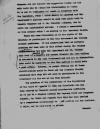
|
4.
September 30, 1927.
"Developments in the Nicaraguan Situation during
the absence of Mr. Olds August 5 to October 3,"
from Edwin V. Morgan, State Dept., to Robert Olds,
State Dept., Washington, p. 4.
"[...] Chamorro did not receive the suggestion
kindly and his only reply was to resign his
Ministership in Paris. He is now in Washington
and seeks an interview with the Secretary, which
I think should be accorded and the Department’s
position should be made very plain both to
General Chamorro and to Mr. Chandler Anderson,
who is still his confidential adviser. I attach
a memorandum on this subject which I am sending
to the Secretary to-day. ¶ There was some
discussion as to the rights of the Liberals to
participate in the Diaz Government and holding
cabinet positions. It was ascertained that no
definite promises had been made to that effect
during the Stimson negotiations but both the
Department and Mr. Stimson felt that if a couple
of capable and honest Liberals who were willing
to cooperate in the Diaz Government and not act
as obstructionists could be appointed to the
Diaz cabinet it would have a good effect.
However, no people filling all of these
qualifications could be found and the Liberals
finally announced that they did not care to
participate in the Government and the matter was
then dropped. ¶ The question of the restoration
of the Magistrates of the Court of Appeals in
Leon and Bluefields who had been removed by
Chamorro caused considerable difficulty as it
led to a dispute between the Supreme Court and
Congress. However, Mr. Munro [Munroe?] now
reports that this has been settled by a
compromise satisfactory to both parties and the
incident, I think, may be considered as closed.
¶ General […]"
|
|
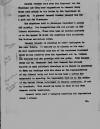
|
5. September 30,
1927. "Developments in the Nicaraguan
Situation during the absence of Mr. Olds August
5 to October 3," from Edwin V. Morgan,
State Dept., to Robert Olds, State Dept.,
Washington, p. 5.
"[...] General Crowder went over the Electoral
Law for Nicaragua and made some suggestions to
General McCoy which were cabled to the latter by
the Department on August 31. In general General
Crowder thought the Law a good one for
Nicaragua. ¶ The elections held in Nicaragua
September 4 passed off quietly. The
Conservatives did not contest in the Liberal
districts. There have been no serious protests
as to the manner in which the elections were
conducted. The Marines maintained order. ¶
General Moncada is planning to visit Washington
in the near future. (I believe he is already on
his way.) He will unquestionably make us of the
courteous treatment which he has received from
the Department and Mr. Stimson to increase his
own prestige with his party. Both General McCoy
and Mr. Eberhardt feel that Moncada has already
derived as much political advantage as he should
be permitted to from our dealings with him alone
as the representative of the Liberal Party and
that he has been a little too successful in
creating the impression that he is the choice of
the United States Government as Liberal
candidate, if not as President. This should be
borne in mind if and when Moncada visits
Washington. ¶ General McCoy sent a telegram
reporting his impressions which I attach. ¶ Mr.
[…]"
|
|
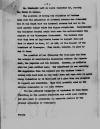
|
6.
September 30, 1927.
"Developments in the Nicaraguan Situation during
the absence of Mr. Olds August 5 to October 3,"
from Edwin V. Morgan, State Dept., to Robert Olds,
State Dept., Washington, p. 6.
"[...] Mr. Eberhardt left on leave September 13,
leaving Mr. Munro [Munroe?] in charge. ¶ The
question of having the Collector of Customs take
over the collection of internal revenue was
discussed but it was found that the internal
revenue had not in the last quarter fallen below
the figure stipulated. Nevertheless the
Collector General could take over the collection
at the request of the Nicaraguan Government. The
bankers feel that they have no legitimate reason
to suggest this and that it should be done, if
at all, at the request of the President of
Nicaragua. They would, however, be glad to see
it done. ¶ The question of new financing for
Nicaragua has been the subject of considerable
discussion between the Department, the Legation
and the bankers. However, no definite plan has
been settled upon. The Department is now
awaiting suggestion from the bankers and the
bankers (whom I talked with last week in New
York) have not been able to agree among
themselves as to what sort of a plan they are
prepared to suggest and undertake. This will
probably come up for serious discussion in the
near future. ¶ The two attached telegrams of
September 22 from Munro [Munroe?] reporting on
the general condition are worth your reading and
give what is presumably an accurate picture of
the present situation in Nicaragua. ¶ SWM:RM"
|
|
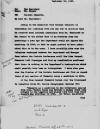
|
7.
September 30, 1927.
"Developments in the Nicaraguan Situation during
the absence of Mr. Olds August 5 to October 3,"
from Edwin V. Morgan, State Dept., to Robert Olds,
State Dept., Washington, p. 7.
"[...] September 30, 1927. ¶ To: The Secretary ¶
From: Mr. Morgan ¶ RE: General Chamorro. ¶ My
dear Mr. Secretary: ¶ Acting on the suspicion
that General Chamorro in discussing his
candidacy with you may try to maintain that he
received some informal assurances from Mr.
Eberhardt or Mr. Dennis to the effect that if he
withdrew from the presidency a year ago the
Department would not oppose his candidacy in
1928; or that he might pretend to have
understood this to be the case. I have carefully
gone over the telegrams exchanged between the
Department and Managua from before the Corinto
Conference until the time General Chamorro left
Nicaragua and find my recollection confirmed
that there is nothing in the Department’s
instructions which could possibly have been so
interpreted. I have also gone over the Minutes
of the Corinto Conference and find no record
there of any mention of Chamorro being a
candidate in 1928. ¶ At the time General
Chamorro turned over the Government to Sebastian
Uriza Mr. Dennis telegraphed (October 30): ¶
“Chamorro as a condition to his withdrawal
exacted from Diaz, Cuadra Pasos and Estrada a
pledge which they brought to the Legation and
signed here that they would support his
candidacy in 1928. All three, especially ¶ Diaz
[…]"
|
|
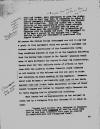
|
8.
September 30, 1927.
"Developments in the Nicaraguan Situation during
the absence of Mr. Olds August 5 to October 3,"
from Edwin V. Morgan, State Dept., to Robert Olds,
State Dept., Washington, p. 8.
"[…] Diaz and Cuadra, were indisposed to give
the pledge but told me that they felt it
necessary in order to secure peaceable
withdrawal of Chamorro and thereby save the
situation. Diaz and Cuadra and a large majority
of the conservative party speak strongly against
Chamorro and I believe that as soon as Diaz
takes over the government the elimination of
Chamorro will be speedy and sure. The agreement
is to be kept a secret by the signers and I
shall decline to make any statement if
questioned with regard thereto.” ¶ Of course the
United States Government was not in any way a
party to this agreement which was purely a
personal one between certain politicians of the
Conservative Party. They doubtless desired to
sign it in the Legation believing that its
having been signed in Mr. Dennis’ presence would
make it more difficult for anyone to deny its
authenticity. Dennis knew the very delicate
state of affairs at that time with the question
whether Chamorro would withdraw or not hanging
in the balance and did not care to raise any
objection to their meeting in the Legation.
Chamorro would seem to have a particularly good
case of bad faith against Diaz and Cuadra Pasos
especially in view of their recent trlegram
[telegram] and letter to Chamorro while Chamorro
was in Paris begging him to withdraw his
candidacy. ¶ That Dennis had no misapprehensions
on the subject is borne out by a telegram from
him (October 3) in which he says: ¶ “Zepeda sent
another long telegram to Chamorro setting forth
such nonsense as that he could deny that he had
been President this year be elected in
constitutional and recognized form”. ¶ At […]"
|
|
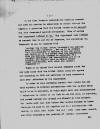
|
9.
September 30, 1927.
"Developments in the Nicaraguan Situation during
the absence of Mr. Olds August 5 to October 3,"
from Edwin V. Morgan, State Dept., to Robert Olds,
State Dept., Washington, p. 9.
"[...] At the time Chamorro resigned his
military command and left the country he
endeavored to obtain through the Legation a
guarantee that the United States would support
the Diaz Government against revolution. This of
course the Department refused to do. The
Department also refused to counsel Diaz to get
rid of Chamorro, but authorized Mr. Eberhardt to
say to Chamorro that ¶ “neither the United
States Government nor yourare [yours are]
demanding his withdrawal, but as it is evident
that the consensus of opinion of his own party
and family is to the effect that his separation
from the military command is advisable if a
peaceful settlement and tranquility are to be
reached, you suggest that he should follow their
indications, with which you concur”. ¶ (December
8) ¶ There is no record that General Chamorro
asked for any assurances that the United States
would not oppose his candidacy in 1928 and
certainly no such assurances were ever
authorized by the Department. ¶ In order to make
perfectly certain that Dennis had not said
anything in informal conversation with the
General which might be so interpreted, or which
might have been misunderstood I telephoned to
Dennis in New York to ask him what, if anything,
had passed between the General and himself on
this subject. Mr. Dennis said that just before
the General decided to leave Nicaragua he came
to the Legation and in a conversation with
Dennis, at which both Adolfo Diaz and Cuadra
Pasos were present, and after discussing the
question of American guarantees ¶ for […]"
|
|
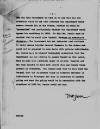
|
10.
September 30,
1927. "Developments in the Nicaraguan
Situation during the absence of Mr. Olds August
5 to October 3," from Edwin V. Morgan,
State Dept., to Robert Olds, State Dept.,
Washington, p. 10.
"[…] for the Diaz Government he went on to ask
what his own situation would be and what
attitude the Department would assume towards him
in the future, whether he would be “prescribed”
and particularly whether the Department would
oppose his candidacy in 1928. To this Mr. Dennis
says he replied that he could give General
Chamorro no assurances whatever. The Department
had not indicated what attitude it would assume
towards General Chamorro in the future and could
not be expected to make deals with private
individuals. Mr. Dennis says he himself
thoroughly understood that the Department was
not willing to commit itself on this point, that
he made that perfectly clear to General Chamorro
and was very careful to have both Adolfo Diaz
and Cuadra Pasos present as witnesses. Mr.
Dennis said that he also told the General that
the Department takes no interest whatever in
individuals in Nicaragua but only in questions
of general policy and what its policy would be
in connection with the elections of 1928 Mr.
Dennis could not say. ¶ Morgan ¶ SWM:RM"
|
|
NEXT PAGE
|
|
|
|
